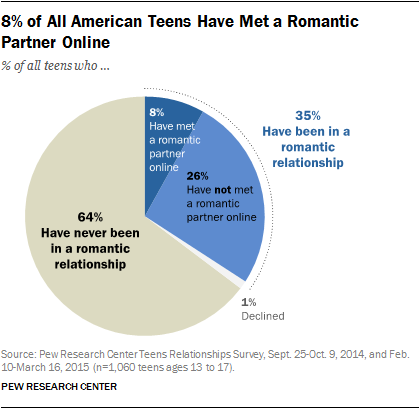
Finding it Online
What to know
Under 18 is under age
Most dating/sex-seeking websites are limited to people over 18. But lying about your age to gain access to these sites is easy.Lots of lying online
While it’s easy for teens to lie about being over 18, it’s equally easy for older adults to pose as being younger than they actually are.Hook-ups vs. dating sites
Different online sites serve different needs. Some, like Tinder and grindr, are used for casual one-nighters. Others, like e-harmony and ok-cupid, foster romantic relationships.Social media meet-ups
In spite of all the dating sites out there, people can meet anywhere online, including social media platforms like facebook, twitter, tumblr, and Instagram.Stranger Dangers
BEFORE
Google them
What you find out online (reverse image look-up, sex-offender registries, social media bios) should match with what they tell your teen.Trust your gut
If something seems off, it probably is—and not worth the risk.Make a plan
Agree ahead of time on exactly what you’re comfortable with. There’s nothing wrong with keeping it short to start.DURING
Keep it public
Get to know each other in public before agreeing to move to someone’s private home.Not who you expected?
Sometimes their face-to-face persona doesn’t match up to their online personality. Be ready for that.Not fun?
No worries. Politely excuse yourself and move on.Deciding “yes”
Be very clear about whether or not you want a romantic relationship—so no one gets hurt. If you go ahead with a sexual encounter, use protection against pregnancy and STIs. Remember that lying about STI status and fertility is easy—especially with strangers off the web.AFTER
Get tested
After every new sexual partner, you should get tested for STIs (Sexually Transmitted Diseases). Learn more on the types and treatments here.Victimized?
Sex against your will is a crime. Get support from police and charities as soon as possible.Helpful Info
Tips for safe and healthy online dating (USNews):
http://health.usnews.com/health-news/health-wellness/articles/2013/02/13/tips-for-safe-and-healthy-online-datingWhy parents need to talk to their teens about online relationships (Huffington Post):
http://www.huffingtonpost.com/claire-mccarthy-md/online-dating-for-teens_b_3682486.htmlIs your teen dating online (Family Online Safety Institute):
https://www.fosi.org/good-digital-parenting/your-teen-dating-online/The Bigger Picture
Teens, Technology and Romantic Relationships
A recent report by the Pew Research Center looked into the current state of teens' use of technology as part of their romantic relationship. Here are a few of the highlights:Relatively few American teens have met a romantic partner online
Overall, 35% of American teens ages 13 to 17 have ever dated, hooked up with or been otherwise romantically involved with another person, and 18% are currently in a romantic relationship. Though 57% of teens have begun friendships in a digital space, teens are far less likely to have embarked on a romantic relationship that started online.
Social media is a top venue for flirting
While most teen romantic relationships do not start online, technology is a major vehicle for flirting and expressing interest in a potential partner. Along with in-person flirting, teens often use social media to like, comment, “friend” or joke around with someone on whom they have a crush.
Girls are more likely to be targets of uncomfortable flirting tactics
Not all flirting behavior is appreciated or appropriate. One-quarter (25%) of all teens have unfriended or blocked someone on social media because that person was flirting in a way that made them uncomfortable.
Social media helps teen daters to feel closer to their romantic partner, but also feeds jealousy and uncertainty
Many teens in relationships view social media as a place where they can feel more connected with the daily events in their significant other’s life, share emotional connections, and let their significant other know they care. At the same time, teens’ use of social media sites can also lead to feelings of jealousy or uncertainty about the stability of their relationships. However, even teens who indicate that social media has played a role in their relationship (whether for good or for bad) tend to feel that its role is relatively modest in the grand scheme of things.

From The Blog
Talking to Teens about Online Experiences?
